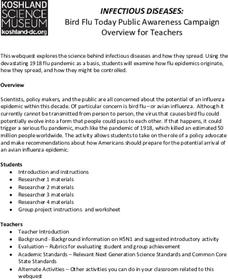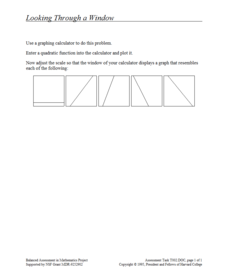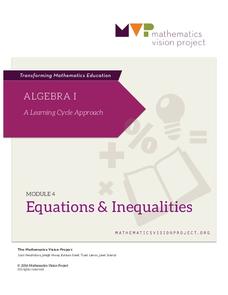Teach Engineering
Exploring Variables While Testing and Improving Mint-Mobiles (for High School)
Mint candies are good for more than just one's breath. Using basic materials such as mint candies, straws, index cards, and Popsicle sticks, scholars create race cars that meet a given budget as well as design constraints. They perform...
Teach Engineering
Nanotechnology in Action: Organic Electronics
Even electronics are going organic. Future engineers learn about organic fibers and their uses in electronics and textiles. Specifically, they study graphene and its properties by creating graphite-based fibers in a laboratory setting...
National Academy of Sciences
Genetic Disease: Putting DNA to Work
Scientific knowledge of genetic information has grown quickly over the last decade. An interactive lesson has learners research the role of science and medicine in diagnosing and treating genetic disorders. They consider the job of the...
Koshland Science Museum
Infectious Disease: Evolving Challenges to Human Health High School Virtual Field Trip
Understanding the science of the spread of infectious diseases is the first step in controlling them. Learners begin by researching the factors that affect the contraction and spread of these diseases and the challenges communities face...
National Academy of Sciences
Lights at Night Webquest
Help learners find ways to become more efficient energy consumers. To start, individuals research how different countries address energy efficiency and then analyze their own carbon footprint. They use their research to identify ways to...
National Academy of Sciences
Infectious Diseases: Bird Flu Today
Understanding how viruses spread has never been more important. A well-designed WebQuest lesson has young scientists research viruses, how they spread, and how they are treated. They also consider the trends in common viruses in the world.
Radford University
Green Cravings
Build up a bag of green. Pupils determine the number of green Skittles in a snack bag and come up with a way to determine how many snack bags it would take to create one bag of only green Skittles. Classmates share their methods and...
Howard Hughes Medical Institute
Weighing the Evidence for a Mass Extinction Part 2: On Land
What can fossils tell us about periods of extinction? Young scholars interpret fossil layers to make conclusions about changes in life during different geological time periods. They analyze the fossils for abundance and diversity as well...
Corbett Maths
Density
A short video introduces the triangle that illustrates how to find any value given the other two in the density formula. Class members use the triangle to work several problems to find the mass, volume, or density of an object.
Howard Hughes Medical Institute
Coral Reefs in Hot Water
Global warming is leaving coral reefs in hot water. What does that mean for their survival? Find out as scholars use authentic satellite data to explore the issue. Learners look for global trends in the data and research the effects the...
CCSS Math Activities
Smarter Balanced Sample Items: High School Math – Claim 3
Communication is the key. A presentation provides 25 sample items for Claim 3, Communicating Reasoning, for the Smarter Balanced High School Math assessment. Items require pupils to answer the question and provide logical reasoning to...
CCSS Math Activities
Smarter Balanced Sample Items: High School Math – Claim 2
Problem solve across the content standards. The presentation slides provide 19 sample items from the Smarter Balanced high school assessment. Items illustrate Claim 2, problem solving, of the test and are drawn from all the high school...
Howard Hughes Medical Institute
Determining the Size and Energy of the K-T Asteroid
Two different groups of scientists published scientific papers in 1980 offering proof of a large asteroid hitting Earth between the Cretaceous and Tertiary layers of ground. Scholars use a worksheet to analyze the same type of data as...
Howard Hughes Medical Institute
Calculating Iridium Fallout from an Asteroid Impact
Should we be afraid of a large asteroid impact on Earth today? Young scientists estimate the size and composition of an asteroid similar to the one that caused the K-T mass extinction. They apply algebraic formulas to answer questions...
Howard Hughes Medical Institute
Look Who's Coming for Dinner: Selection by Predation
What happens when a new predator comes to town? Learners analyze an experiment that studies the effect of predation on selection. They use real data to draw conclusions about the impact a new predator has on a prey species.
CCSS Math Activities
Smarter Balanced Sample Items: High School Math – Target C
Let units pave the way to success. A set of five questions in a helpful PowerPoint presentation highlights the SBAC Claim 1 Target C high school item specifications. It covers the use of units to steer solutions, identifying appropriate...
Howard Hughes Medical Institute
Weighing the Evidence for a Mass Extinction: Part 1 – In the Ocean
Extinction events have happen throughout geologic history, but only five mass extinctions occurred over the last 4.5 billion years. Scholars view fossils from a layer of sediment during an extinction event and observe patterns to draw...
Concord Consortium
Looking through a Window
Here's a window into graphing calculators. Scholars use a graphing calculator to plot a quadratic function. They then adjust the window to make the graph look like that of a linear function and must recreate given graphs.
Concord Consortium
Metric Volume
Master metric measurements. Given the fact that the volume of one milliliter of water is one cubic centimeter, scholars figure out the volume of one liter of water. They must determine the correct unit of length for a unit cube that...
Concord Consortium
Summertopia
What if the unit of money changes tomorrow? Would you be prepared? Learners calculate currency conversions using fictional units of money. The fictional unit's base is 60 rather than 100, which can connect to time or even degrees.
5280 Math
Stories That Formulas Tell
Learn the stories a formula holds. An interesting lesson takes a unique approach to teach how to use formulas. Beginning with a formula, learners predict what the variables stand for and then use the formula to make calculations and tell...
Mathematics Vision Project
Module 4: Equations and Inequalities
Can you justify that mathematically? Help learners see the process of solving as using mathematical properties rather than a set of steps to memorize in the fourth module of a nine-part Algebra I series. The module contains six lessons...
Kenan Fellows
Reading Airline Maintenance Graphs
Airline mechanics must be precise, or the consequences could be deadly. Their target ranges alter with changes in temperature and pressure. When preparing an airplane for flight, you must read a maintenance graph. The second lesson of...
Kenan Fellows
Weight and Balance of an Airplane
A career in aeronautics might be calling your class members. Building from the previous two lessons in the series, learners continue analyzing the mathematics of aeronautics. Groups create a paper airplane using paperclips for balance....

























